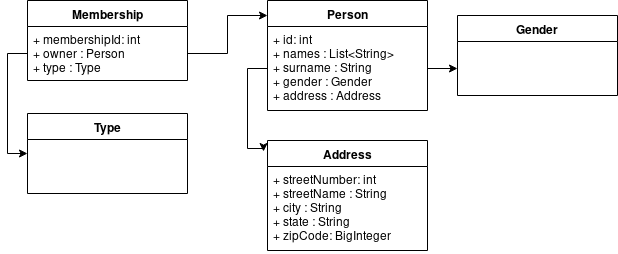When using JAXB
Not many examples show this, but how you use JAXB in your application can make a huge difference in the performance (and memory usage).
The example
In this blog post I’ll use an example Object called Membership that looks something like this:

We will marshal and unmarshal this object to and from XML using JAXB.
Create the context in a static block (or at least only once)
The biggest mistake I usually see is that the JAXB context gets created on every request:
01 02 03 04 05 06 07 08 09 10 11 12 13 14 15 16 17 18 19 20 21 22 23 24 25 | public String marshal(Membership membership){ StringWriter stringWriter = new StringWriter(); try { JAXBContext context = JAXBContext.newInstance(Membership.class); Marshaller m = context.createMarshaller(); m.setProperty(Marshaller.JAXB_FRAGMENT, Boolean.TRUE); m.setProperty(Marshaller.JAXB_FORMATTED_OUTPUT, Boolean.TRUE); m.marshal(membership, stringWriter); String xml = stringWriter.toString(); stringWriter.close(); return xml; } catch (JAXBException | IOException ex) { throw new RuntimeException(ex); } } public Membership unmarshal(String xml) { try { JAXBContext context = JAXBContext.newInstance(Membership.class); Unmarshaller u = context.createUnmarshaller(); return (Membership)u.unmarshal(new StringReader(xml)); }catch (JAXBException ex) { throw new RuntimeException(ex); } } |
(Also see the example code here)
The problem here is the JAXBContext.newInstance method that creates the context. The context only changes if the object structure changes, and that only happens on a code change, so we can safely only do this once, so change this to be created in a static block like this:
01 02 03 04 05 06 07 08 09 10 11 12 13 14 15 16 17 18 19 20 21 22 23 24 25 26 27 28 29 30 31 32 | public String marshal(Membership memberships){ StringWriter stringWriter = new StringWriter(); try { Marshaller m = context.createMarshaller(); m.setProperty(Marshaller.JAXB_FRAGMENT, Boolean.TRUE); m.setProperty(Marshaller.JAXB_FORMATTED_OUTPUT, Boolean.TRUE); m.marshal(memberships, stringWriter); String xml = stringWriter.toString(); stringWriter.close(); return xml; } catch (JAXBException | IOException ex) { throw new RuntimeException(ex); } } public Membership unmarshal(String xml) { try { Unmarshaller u = context.createUnmarshaller(); return (Membership)u.unmarshal(new StringReader(xml)); }catch (JAXBException ex) { throw new RuntimeException(ex); } } private static JAXBContext context; static{ try { context = JAXBContext.newInstance(Membership.class); } catch (JAXBException ex) { throw new RuntimeException(ex); } } |
(Also see the example code here)
So lets look at what difference that makes.
Batch Example.
If we convert 10000 objects to and from XML in a loop (one at a time) these are the results:
1 2 3 4 | Testing 10000 with Bad utilMarshal took: 10804 msUnmarshal took: 13762 ms |
and then with the static block:
1 2 3 4 | Testing 10000 with Good utilMarshal took: 90 msUnmarshal took: 428 ms |
That is marshalling 120 times and unmarshalling 32 times faster!!
(Full example here)
Concurrency Example.
Similarly, when doing this with multiple concurrent requests you should see the same results. So when we deploy this to some server (thorntail in my example), and exposing a REST endpoint to marshal and unmarshal, we can then use something like siege to generate concurrent traffic to the server:
Output of the bad example:
01 02 03 04 05 06 07 08 09 10 11 12 | Transactions: 255 hitsAvailability: 100.00 %Elapsed time: 7.91 secsData transferred: 0.54 MBResponse time: 5.13 secsTransaction rate: 32.24 trans/secThroughput: 0.07 MB/secConcurrency: 165.52Successful transactions: 255Failed transactions: 0Longest transaction: 6.88Shortest transaction: 3.47 |
Output of the good example:
01 02 03 04 05 06 07 08 09 10 11 12 | Transactions: 255 hitsAvailability: 100.00 %Elapsed time: 1.80 secsData transferred: 0.53 MBResponse time: 0.52 secsTransaction rate: 141.67 trans/secThroughput: 0.30 MB/secConcurrency: 73.12Successful transactions: 255Failed transactions: 0Longest transaction: 0.78Shortest transaction: 0.05 |
Note the ‘concurrency’ value difference (Concurrency is average number of simultaneous connections, a number which rises as server performance decreases)
(Full example here)
When the file is very very big.
If your input file is too big, you might get a java.lang.OutOfMemoryError exception.
To make sure that you can handle big files effectively, you can make sure that you are using a SAX Parser when creating the input:
01 02 03 04 05 06 07 08 09 10 11 12 13 14 15 16 17 18 19 20 21 22 | public Membership unmarshalWithSAX(InputStream xml){ try { InputSource inputSource = new InputSource(xml); SAXParserFactory spf = SAXParserFactory.newInstance(); spf.setNamespaceAware(true); spf.setValidating(true); SAXParser saxParser = spf.newSAXParser(); saxParser.setProperty(JAXP_SCHEMA_LANGUAGE, W3C_XML_SCHEMA); XMLReader xmlReader = saxParser.getXMLReader(); SAXSource source = new SAXSource(xmlReader, inputSource); Unmarshaller u = context.createUnmarshaller(); return (Membership)u.unmarshal(source); }catch (ParserConfigurationException | SAXException | JAXBException ex) { throw new RuntimeException(ex); } } private static final String JAXP_SCHEMA_LANGUAGE = "http://java.sun.com/xml/jaxp/properties/schemaLanguage"; |
(Full example here)
Get it all
You can get all the ‘good’ in a simple library:
Using it in your code
(See https://github.com/phillip-kruger/jaxb-lib)
1 2 3 4 5 | <dependency> <groupId>com.github.phillip-kruger.jaxb-library</groupId> <artifactId>jaxb-lib</artifactId> <version>1.0.0</version> </dependency> |
Marshal
1 2 | JaxbUtil jaxbUtil = new JaxbUtil(); byte[] xml = jaxbUtil.marshal(myJAXBObject); |
Unmarshal
1 2 | JaxbUtil jaxbUtil = new JaxbUtil(); MyJAXBObject myJAXBObject = jaxbUtil.unmarshal(MyJAXBObject.class,xml); |
Getting the XSD for a JAXB Object
1 2 | XsdUtil xsdUtil = new XsdUtil(); String xsd = xsdUtil.getXsd(MyJAXBObject.class); |
Published on Java Code Geeks with permission by Phillip Krüger, partner at our JCG program. See the original article here: When using JAXB… Opinions expressed by Java Code Geeks contributors are their own. |


